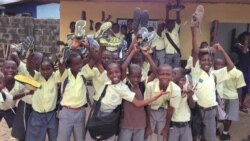Fifty-year-old Bobby Smith of Germantown, Maryland, knows he might not be alive today if he still lived in his native Sierra Leone, one of the poorest countries in the world. The average life expectancy there is only 47. His chances would be even be slimmer now, as Ebola ravages the nation. Smith has lived in the United States for 25 years and came as an immigrant sponsored by his sister.
To give back, three years ago he began a small volunteer organization, Hope for Lives in Sierra Leone, to help the disadvantaged in his homeland. When the Ebola epidemic began this year, Smith got donations of medical supplies, such hospital gowns, masks and gloves, to send to the country’s main hospital in the capital, Freetown, to protect health workers there. He’s also been sending rolling beds and wheelchairs since the facility doesn’t have any.
His mission has become personal since two of his relatives in Sierra Leone have died from Ebola. “My people are dying,” he said. “I’m just trying to help as much as I can.”
Unused, usable supplies
Smith knows what it’s like to save lives, since he works on the surgical team in the trauma unit at Suburban Hospital in Bethesda, Maryland. Much of what he ships back home are surplus items donated by hospitals, which Smith says can be put to good use in a country sorely lacking medical supplies.
Pointing to partial rolls of medical tape, he explained, “[The hospitals] don’t want to reuse it, so they’re just going to dump it.”
Along with other volunteers, Smith packs the materials at a warehouse in Fairfax, Virginia, belonging to the Brother’s Brother Foundation, a U.S. charity that provides medical supplies to needy countries. Luke Hingson, president of the group, calls Smith inspirational. “He sees a problem and works to bring the best out of other people to solve the problem.”
A Maryland chapter of the international service organization Rotary Club has donated $5000 to Hope for Lives in Sierra Leone. Barbara Ott, head of the group, says Smith stands out in the work he does for others, “by giving his heart and soul and personal resources.”
More than medicine
During the past three years, Smith has also jump-started other projects.
Some fishermen in Sierra Leone didn’t have boats, so using his own money, plus donations, he bought three boats for them to share.
His former primary school didn’t have a library, so he helped build one and filled it with books.
And when Smith sent over four thousand pairs of donated shoes, he saw the eyes of schoolchildren light up. “It’s like Christmas for them,” he said.
He also has handed out meals for homeless amputees, living together in camps, who lost their limbs during Sierra Leone’s brutal 11-year-long civil war that ended in 2002. He met them at a beach where they were having some fun in their otherwise difficult lives.
“After the civil war there were thousands of amputees without homes," Smith explained. "Every Sunday, they have a group that plays soccer.”
His organization is also helping the homeless make money. “We sent tools to them so they can make a living because they can make pots and pans.”
Smith's efforts show that small projects can have big results, improving and saving lives.
“You don’t need a lot of money to help people overseas,” he observed.
Hope for Lives in Sierra Leone is continuing to send medical supplies. Once the threat of Ebola has ended in Sierra Leone, the group plans to send a team of health workers from the U.S. to perform surgeries for free.







